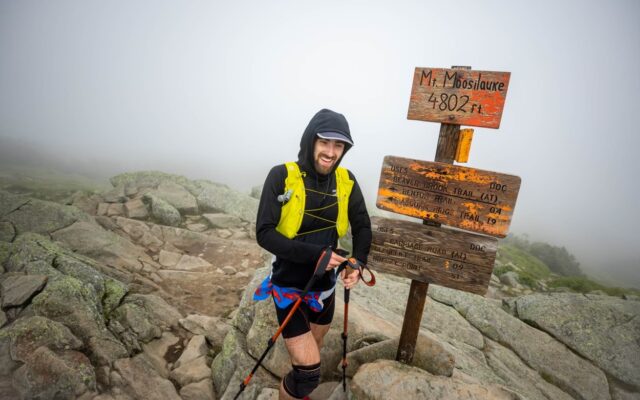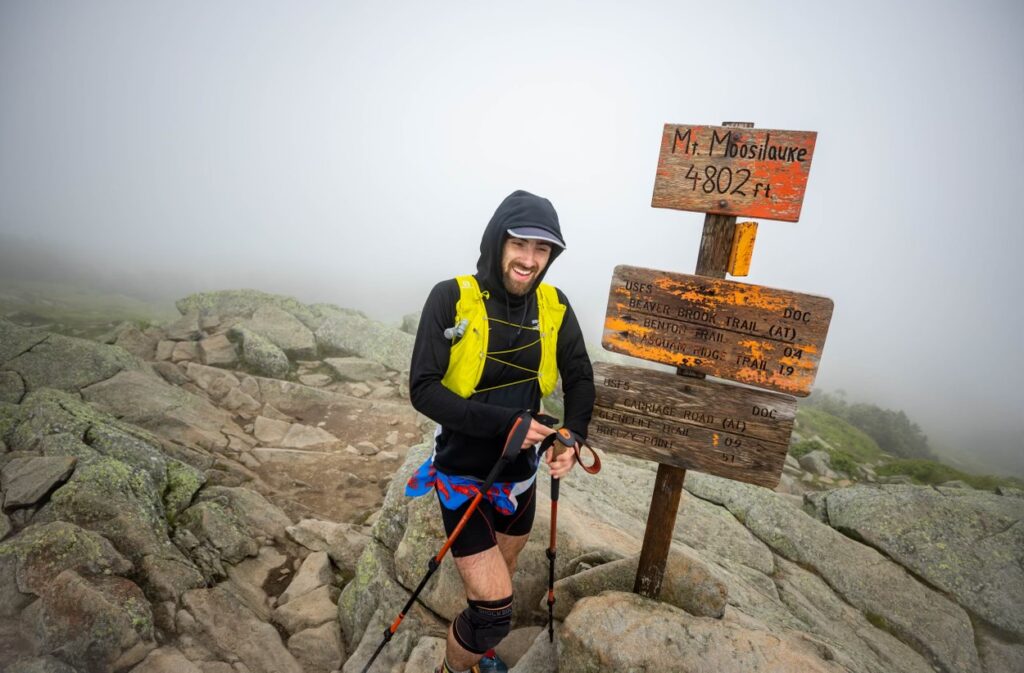
Mainer sets record summiting 48 New Hampshire mountains in three days
By Pete Warner, Bangor Daily News Staff
When his first-year classmates at Dartmouth College’s Geisel School of Medicine ask Will Peterson what he did during his summer vacation, he’ll have quite a story to tell.
The 23-year-old hiker and trail runner from Naples put his name in the hiking record books recently when he ascended all 48 of New Hampshire’s 4,000-foot peaks in a span of 3 days, 12 hours and 36 minutes.
Peterson established the fastest known time for a supported hike of those mountains, which means he received rides between trailheads, was supplied with water and used pace runners.
The new time standard was more than two hours faster than the time posted by Andrew Thompson in July 2014.
“It’s just given me a really good feeling of satisfaction,” Peterson said. “I feel like this is something I can hang my hat on, and hold on to for a long time and be really proud of, and not really feel the need to do it for quite a while.”

LAST OF 48 PEAKS – Will Peterson of Naples stands atop Mt. Moosilauke, the last peak he climbed while setting the record for summiting all 48 of the 4,000-foot mountains in New Hampshire.
The effort is the second such fastest known time for Peterson involving New Hampshire’s 4,000-foot peaks. He established the unsupported hiking record in 2020, completing the run in 5 days, 13 hours, 5 minutes.
The unsupported category allows no help of any kind.
“I think the unsupported one’s probably a little bit physically harder, but I think this one was definitely mentally and logistically harder,” Peterson said.
Peterson and close friend Xander Keiter of South Portland began their effort on Sunday, June 19. They actually delayed the planned start by a day because of snow, rain and high winds at higher elevations.
Those same conditions claimed the life of a Massachusetts hiker on Mount Washington.
Peterson and Keiter teamed up before in June 2021 along with Nik Hase to run the Appalachian Trail’s 100-Mile Wilderness from Monson to Abol Bridge. The trio accomplished the feat in a span of 36 hours. Peterson also hiked the Appalachian Trail in 2019.
The New Hampshire 48 supported fastest known time has been on Peterson’s bucket list but an attempt last summer ended with him having to pull out because of physical issues. That gave him and Keiter plenty of time to plan.
Peterson estimates that the document outlining all of the details for the hike was 20 pages long.
It included how tall each mountain was, the distance between the summits, the driving mileage between trailheads and how much time and food would be required to go from one segment to the next. They also calculated who would serve as pace runners and how fast they wanted to go on each section.
“We had everything very meticulously planned out,” Peterson said.
The men also knew that they might encounter situations that forced them to alter the plans. One such wrinkle happened on the second day of the run.
Peterson miscalculated their path descending amid a bushwhack from Owl’s Head Mountain.
“I just messed up the navigation so badly,” said Peterson, who was certain his blunder had cost him and Keiter a chance at the record.
They were hiking with Tidd, one of Peterson’s mountain mentors, who was among the pace runners. Tidd, himself a former White Mountains fastest known time record holder, and Keiter looked at the map and crunched the numbers.
All was not lost.
“They took the lead and found our way back to the trail. That was absolutely huge,” Peterson said. “That just speaks to how important it is to have other experienced people out there with you.”
Peterson recovered emotionally after Tidd said they had lost perhaps only 30-45 minutes of time. It came as a huge relief.
“I thought I had cost us hours,” Peterson said, admitting that it took a long time to put the situation behind him.
That kind of teamwork was pivotal to the success of the hike. Peterson said a dozen family members — including his dad Eric Peterson and Keiter’s father, Chris Keiter — and friends aided with resupplying water and other needs and pacing on the trail.
Will Peterson said one friend, Jack Kuenzle, actually carried all of his supplies and belongings, with the exception of his trekking poles and his cell phone, on one section.
“Whenever I needed some more water, I would just grab it from him,” Peterson said. “That was super nice.”
Despite the grueling nature of running up and down 48 mountains, Peterson said they were able to sleep a total of about eight hours over the three nights.
The men were into the home stretch when another problem arose. With 41 mountains behind them, Keither was forced to end his quest due to an ankle injury.
It came at 1 a.m., near the summit of one of the mountains. Keiter had hiked about 30 miles after first being injured, which Peterson called incredible.
“By the end of it, he was in such bad pain that he was hallucinating and losing consciousness,” Peterson said.
He was worried about his friend and felt helpless, since he was a full mountain ahead. However, a group of people were able to get Keiter safely down to the trailhead.
“That was a real bummer, but having him with me for so much of it was definitely huge,” said Peterson, who was re-energized after learning that his friend was OK.
The men had talked about the possibility of one having to end the run prematurely, since so many things can go wrong. Peterson used Keiter’s misfortune as motivation.
“It’s sad that we couldn’t both finish it, but it can happen,” Peterson said. “With these long things, sometimes your body just says no and you can’t go anymore.”
Peterson encountered rain while taking on Mount Moosilauke, the final leg of the hike. He completed the run, stopping his watch upon getting back to the trailhead.
The whole hike covered more than 200 miles and included 15 miles of elevation change. The highest point on the run was the 6,228-foot summit of Mount Washington.
Peterson stressed the team aspect of the operation in making his job much easier. The fastest known time helped him pull together four years of hiking and competitive trail running challenges.
“Unsupported in 2020 was kind of the start of this competitive trail running thing for me,” he said. “This effort kind of felt like a nice, neat culmination of all this stuff.”
After three days of subsisting almost exclusively on powdered Infinit supplement mixed in water to cover his needs of 6,500 to 7,000 calories per day, Peterson was dreaming about his first real meal.
In the parking lot, he enjoyed some tasty pastries. But he had other desires.
At the top of the list was an Oreo McFlurry from McDonald’s, where he also consumed a bacon McDouble, a McChicken and a large order of french fries.
“It tastes amazing,” he said, noting that he almost never visits the “Golden Arches.”
Peterson plans to take a break from long-distance trail running as he prepares for what he knows will be a demanding time as a medical student at Dartmouth. But that doesn’t mean he won’t stay active.
“My hope is that with proper time management that I’ll still be able to do single-day efforts,” he said. “I’d love to be able to do a lot of backcountry skiing in the winter or an ultramarathon in the summer.”